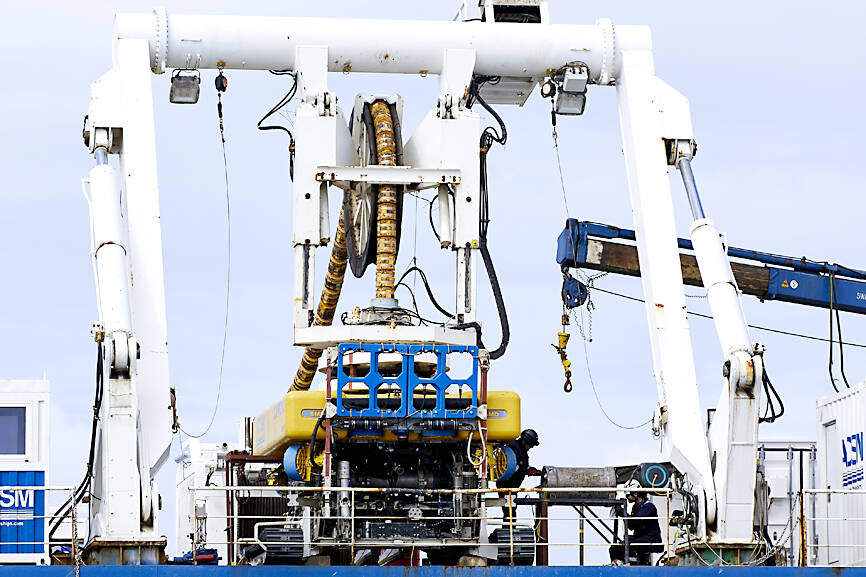The US Federal Communications Commission (FCC) voted unanimously on Thursday to launch a “major, comprehensive review” and update of rules governing submarine cables amid an increase in potential state-sponsored attacks on critical infrastructure.
FCC Chair Jessica Rosenworcel said the review of the systems responsible for facilitating the flow of global Internet traffic is long overdue.
The agency previously granted cable landing licenses for 25 years “without requiring any update about who owns and controls the facility.”

Photo: AP / Craig Mitchelldyer
The last review was in 2001, and the technology, economics and national security environment surrounding the systems have changed tremendously since then, the FCC said.
There are 84 FCC-licensed cable systems.
“That is a quarter of a century during which information about foreign investment and interconnection essential for the secure flow of data traffic is not updated. That is too long,” Rosenworcel said.
There have been several high-profile instances of subsea cable disruptions recently, including Taiwan’s accusation that two Chinese vessels severed cables providing Internet access to Lienchiang County.
Earlier this year, three cables serving Europe and Asia were severed amid Houthi attacks in the Red Sea, and Baltic Sea cables serving Germany, Sweden, Estonia, Lithuania and Finland also experienced tampering multiple times, including as recently as this week.
“While the details of these incidents remain in dispute, what is clear is that these facilities — with locations that are openly published to prevent damage — are becoming a target,” Rosenworcel said. “Add to this vulnerabilities that come from trawling anchors, aquatic life, and climate disturbances and it is clear we need to do more to protect these facilities.”
The FCC said it is specifically seeking public comment on how it could make its subsea cable rules more efficient while ensuring the security of critical infrastructure.
It proposes that subsea cable operators check in with the commission every three years and is considering whether the 25-year license term should be shortened.
The agency is debating whether it should collect more information on the companies seeking subsea cable licenses, including taking a closer look at their “ownership, control and use of a subsea cable system.”

SEEKING CLARITY: Washington should not adopt measures that create uncertainties for ‘existing semiconductor investments,’ TSMC said referring to its US$165 billion in the US Taiwan Semiconductor Manufacturing Co (TSMC, 台積電) told the US that any future tariffs on Taiwanese semiconductors could reduce demand for chips and derail its pledge to increase its investment in Arizona. “New import restrictions could jeopardize current US leadership in the competitive technology industry and create uncertainties for many committed semiconductor capital projects in the US, including TSMC Arizona’s significant investment plan in Phoenix,” the chipmaker wrote in a letter to the US Department of Commerce. TSMC issued the warning in response to a solicitation for comments by the department on a possible tariff on semiconductor imports by US President Donald Trump’s

‘FAILED EXPORT CONTROLS’: Jensen Huang said that Washington should maximize the speed of AI diffusion, because not doing so would give competitors an advantage Nvidia Corp cofounder and chief executive officer Jensen Huang (黃仁勳) yesterday criticized the US government’s restrictions on exports of artificial intelligence (AI) chips to China, saying that the policy was a failure and would only spur China to accelerate AI development. The export controls gave China the spirit, motivation and government support to accelerate AI development, Huang told reporters at the Computex trade show in Taipei. The competition in China is already intense, given its strong software capabilities, extensive technology ecosystems and work efficiency, he said. “All in all, the export controls were a failure. The facts would suggest it,” he said. “The US

The government has launched a three-pronged strategy to attract local and international talent, aiming to position Taiwan as a new global hub following Nvidia Corp’s announcement that it has chosen Taipei as the site of its Taiwan headquarters. Nvidia cofounder and CEO Jensen Huang (黃仁勳) on Monday last week announced during his keynote speech at the Computex trade show in Taipei that the Nvidia Constellation, the company’s planned Taiwan headquarters, would be located in the Beitou-Shilin Technology Park (北投士林科技園區) in Taipei. Huang’s decision to establish a base in Taiwan is “primarily due to Taiwan’s talent pool and its strength in the semiconductor

French President Emmanuel Macron has expressed gratitude to Hon Hai Precision Industry Co (鴻海精密) for its plan to invest approximately 250 million euros (US$278 million) in a joint venture in France focused on the semiconductor and space industries. On his official X account on Tuesday, Macron thanked Hon Hai, also known globally as Foxconn Technology Group (富士康科技集團), for its investment projects announced at Choose France, a flagship economic summit held on Monday to attract foreign investment. In the post, Macron included a GIF displaying the national flag of the Republic of China (Taiwan), as he did for other foreign investors, including China-based